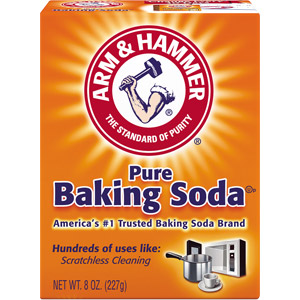 A lot of ifs in this study, but... if it holds up, then a really, really cheap medicine. A study by researchers at Augusta University (in Georgia) found that drinking a little baking soda (sodium bicarbonate or NaHCO3 ) with water tells the spleen to go easy on the immune response. In other words, ingesting the baking soda promotes an anti-inflammatory response by the spleen ("activates splenic anti-inflammatory pathways") - which the researchers found in both rats and humans.
A lot of ifs in this study, but... if it holds up, then a really, really cheap medicine. A study by researchers at Augusta University (in Georgia) found that drinking a little baking soda (sodium bicarbonate or NaHCO3 ) with water tells the spleen to go easy on the immune response. In other words, ingesting the baking soda promotes an anti-inflammatory response by the spleen ("activates splenic anti-inflammatory pathways") - which the researchers found in both rats and humans.
The researchers thought this could mean that perhaps some day drinking a little baking soda each day could lower the body's inflammation in kidney disease and autoimmune diseases like rheumatoid arthritis. How much baking soda? The researchers tested 2 g of NaHCO3 (less than 1/2 teaspoon) dissolved in 250 ml of bottled water in a small group of healthy adults. More studies need to be done. From Science Daily:
Drinking baking soda could be an inexpensive, safe way to combat autoimmune disease
A daily dose of baking soda may help reduce the destructive inflammation of autoimmune diseases like rheumatoid arthritis, scientists say. They have some of the first evidence of how the cheap, over-the-counter antacid can encourage our spleen to promote instead an anti-inflammatory environment that could be therapeutic in the face of inflammatory disease, Medical College of Georgia scientists report in the Journal of Immunology.
They have shown that when rats or healthy people drink a solution of baking soda, or sodium bicarbonate, it becomes a trigger for the stomach to make more acid to digest the next meal and for little-studied mesothelial cells sitting on the spleen to tell the fist-sized organ that there's no need to mount a protective immune response. "It's most likely a hamburger not a bacterial infection," is basically the message, says Dr. Paul O'Connor, renal physiologist in the MCG Department of Physiology at Augusta University and the study's corresponding author.
Mesothelial cells line body cavities, like the one that contains our digestive tract, and they also cover the exterior of our organs to quite literally keep them from rubbing together. About a decade ago, it was found that these cells also provide another level of protection. They have little fingers, called microvilli, that sense the environment, and warn the organs they cover that there is an invader and an immune response is needed.
Drinking baking soda, the MCG scientists think, tells the spleen -- which is part of the immune system, acts like a big blood filter and is where some white blood cells, like macrophages, are stored -- to go easy on the immune response. "Certainly drinking bicarbonate affects the spleen and we think it's through the mesothelial cells," O'Connor says. The conversation, which occurs with the help of the chemical messenger acetylcholine, appears to promote a landscape that shifts against inflammation, they report.
In the spleen, as well as the blood and kidneys, they found after drinking water with baking soda for two weeks, the population of immune cells called macrophages, shifted from primarily those that promote inflammation, called M1, to those that reduce it, called M2. Macrophages, perhaps best known for their ability to consume garbage in the body like debris from injured or dead cells, are early arrivers to a call for an immune response.
One of the many functions of the kidneys is balancing important compounds like acid, potassium and sodium. With kidney disease, there is impaired kidney function and one of the resulting problems can be that the blood becomes too acidic. ... Clinical trials have shown that a daily dose of baking soda can not only reduce acidity but actually slow progression of the kidney disease, and it's now a therapy offered to patients.
"We started thinking, how does baking soda slow progression of kidney disease?" O'Connor says. That's when the anti-inflammatory impact began to unfold as they saw reduced numbers of M1s and increased M2s in their kidney disease model after consuming the common compound.
When they looked at a rat model without actual kidney damage, they saw the same response. So the basic scientists worked with the investigators at MCG's Georgia Prevention Institute to bring in healthy medical students who drank baking soda in a bottle of water and also had a similar response. "The shift from inflammatory to an anti-inflammatory profile is happening everywhere," O'Connor says. "We saw it in the kidneys, we saw it in the spleen, now we see it in the peripheral blood."
The shifting landscape, he says, is likely due to increased conversion of some of the proinflammatory cells to anti-inflammatory ones coupled with actual production of more anti-inflammatory macrophages. The scientists also saw a shift in other immune cell types, like more regulatory T cells, which generally drive down the immune response and help keep the immune system from attacking our own tissues. That anti-inflammatory shift was sustained for at least four hours in humans and three days in rats.
O'Connor hopes drinking baking soda can one day produce similar results for people with autoimmune disease. "You are not really turning anything off or on, you are just pushing it toward one side by giving an anti-inflammatory stimulus," he says, in this case, away from harmful inflammation. "It's potentially a really safe way to treat inflammatory disease."
